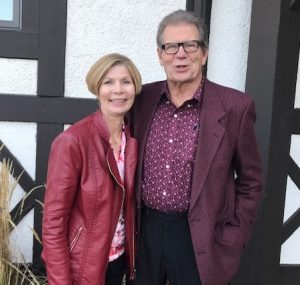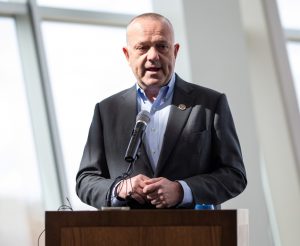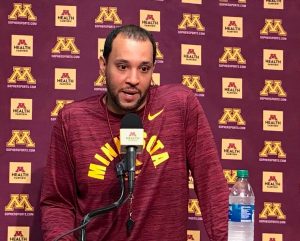Between now and the University of Minnesota’s opening football game August 29 against North Carolina, no Golden Gophers player will prompt more curiosity and anticipation than transfer quarterback Max Brosmer. He made FCS All-American last fall at New Hampshire while leading the FCS in passing yards and total offense. Yet there is no certain way to know how well he will perform at a higher level against FBS/Big Ten teams.
That answer will have to wait until the Gophers go through their 12-game schedule, but a few things are known after Brosmer’s short tenure here that includes workouts in the winter and now spring practices that began last week. The intel is this: the transfer QB is an adult, with a pro’s work ethic, dedication to preparation and a desire to lead.
“I live and die by preparation,” said Brosmer who played five years at New Hampshire and was a team captain in 2023. “I know that my skill only goes so far. I don’t run a 4.4. I can’t escape every single blitz but if I know it’s coming, then maybe I can have a chance to get out of it. …I think that it (escaping trouble) comes from a team effort. Comes from the staff and also a group effort from the offensive line, the running back room, the receiver room and me as well–together (with us) doing it. …There’s a lot that goes into it.”
Brosmer, already named a Gopher captain, has known for years that he doesn’t have the strongest arm to throw the football as hard or far as some of his peers. “The thing that I had to improve at a young age was to be able to throw to tight windows before they were there,” he said.

At New Hampshire last year Brosmer attempted 459 passes and was intercepted only five times. That kind of success comes from repetition and knowing where the holes will be in the secondary. Brosmer will also tell you success comes from knowing his receivers and mutually being in synch in all aspects of passing and catching.
It will take time on and off the field for Brosmer to develop things with his receivers, but he already has their attention and impressed both them and other teammates. Wide receiver Daniel Jackson, the team’s star wide receiver, refers to Brosmer as the “general” for the way he has taken over the huddle and been embraced and trusted by teammates.
“… In the huddle, on the field when we’re already lined up, he’s able to make adjustments on the fly,” Jackson said. “He’s able to see things that really no one else on the field is able to see. And he’s able to put us receivers and running backs in the best position to go out there and be successful. It’s just his knowledge of the game is very, very impeccable.”
The Gophers have struggled in recent seasons to develop a consistent passing offense. Last year they ranked 123rd among 130 FBS teams in passing yards per game at 143.4.
Brosmer is aware of the challenge but has noted there is a strong willingness by him and others to put in the effort to make the results better in 2024, which will be his one year of eligibility at Minnesota. “I am super, super excited,” he said.
Brosmer added he sees talent to work with and added this about the receiver room: “There’s a crave and a desire to grow and to progress. …”
Brosmer is talking about work ethic and he has created a sense of commitment that goes beyond his teammates. “He’s the hardest worker I’ve been around. No question,” said co-offensive coordinator Greg Harbaugh Jr. who talks about “a partnership” with his QB.
Harbaugh said Brosmer has challenged him and changed him. “The best thing about (being) a coach is when a guy can challenge you, and he makes you better every single day. And I think that is the number one thing that he does. Me and him are together all the time, and we’re working together. He challenges me to make sure that every meeting that I have…that I’m ready to roll.”
The Gophers, 6-7 last year, didn’t find the passing consistency they needed with Athan Kaliakmanis who has transferred to Rutgers. Minnesota coach P.J. Fleck was looking for an experienced and accomplished quarterback in the portal.
“…We talked about how we needed a quarterback to walk in here and connect the entire football team,” Fleck said before spring practice started about his quarterback. “And that was going to be a tall task for anybody. But you can tell in two and a half short months this team is completely connected to him, has leaned on him and has looked to him for guidance.
“And that’s a credit to our players, but also a credit to him that he’s been able to do that in such a short amount of time. And it’s real, it’s authentic. He’s a special young man. And we look forward to him actually throwing some footballs here coming up. …Because this isn’t like having a freshman come in here that’s really talented.
“He has all the experience that you want. That doesn’t promise you anything, but it gives you a better chance. And his work ethic is through the roof and has really taken this team probably farther quicker than maybe expected.”
Coming out of Centennial High School in Roswell, Georgia he threw for 3,459 yards as a senior, but he didn’t have FBS recruiters knocking down his door. Late last year, though, there were FBS programs pursuing the high-profile Brosmer, but he didn’t take long to decide on the Gophers.
“…I wanted to get in out of the portal as quickly as I could as long as I was going to the school that fit me the best. Minnesota being that school for me.”
The fit has been more than fine so far.
Gophers Travel Notes: Rose Bowl Return
Stillwater-based Creative Charters has been arranging Golden Gophers football fan trips since 1993 and will be carrying on that tradition in the fall including the October 12 game against UCLA at the Rose Bowl. Minnesota last played in the Rose Bowl on January 1, 1962—ironically against UCLA.
For over 60 years Gophers fans have yearned to see their team back in the “Granddaddy” of all bowl games. It hasn’t happened but the next best thing is playing in Pasadena during the regular season where the Bruins host their home games.
Creative has already sold out three trips for the return to the Rose Bowl. “We have the entire Godfrey Hotel,” Steve Erban told Sports Headliners.

Steve and wife Dorothy own Creative Charters, and they’re adding two more trip packages to accommodate the strong interest in the game. The Godfrey and now the Loews, both in Hollywood, are host hotels. Creative Charters has also scheduled a Warner Bros. Studio Tour as part of the trip experience.
Fleck said going back to the Rose Bowl means coming “full circle for a lot of families” in a football program that is tradition rich. U defensive lineman Danny Striggow, a Minnesota native, said of the game and the playing venue: “That’s an awesome opportunity.”
A potential 600 travelers going with Creative Charters thinks so, too.
Comments Welcome







